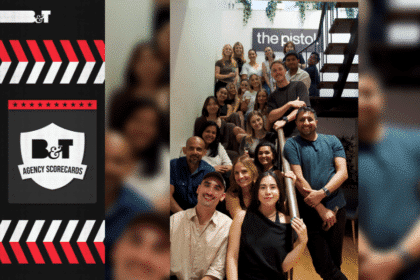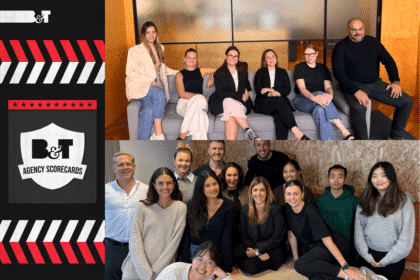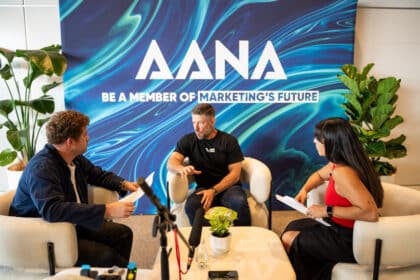As Peter Horgan prepared to open OMG’s Transforming Tomorrow conference in Sydney yesterday, he sat down with B&T to discuss the conference and all things media. This is part 1 of the result of that chat.
What can we expect to see today? You’ve got 650 people registered who are they and what do you have in store for them?
A lot of clients, a lot of partners. It’s helping marketers navigate the labyrinth of the promised land of what marketing automation is supposed to do. Addressing the disconnect between what boards are being promised and what is being delivering at the moment.
There’s also that massive FOMO that is everyone’s either doing it better or we’re getting left behind. But if you do get it right, then it’s game changing.
Our plan, our play versus the consultancies, is what’s the next thing you need to fix? We offer an impartial view, what do you need to fix next? And then we execute off the back of what comes out of that next phase.
What we don’t do is a massive deep dive. We won’t do what a traditional consultancy would do with a six month project at a ‘cajillion’ dollars and a recommendation off the back and then you go: over to you guys.
With [traditional consultancies], if it doesn’t work, someone else’s stuffed up on the execution, but we’re on the hook for execution.
Is that the big difference you think between you guys and the big consultancies?
Execution is not sexy, but it’s complicated and it’s massive. There’s big infrastructure for it, it’s low margin and it’s fiddly. So there’s some pretty good barriers to entry there. [We don’t do] high end business strategy because that’s the domain of consultancies with fleets of Harvard MBAs, but I think where we’re good is in broader marketing strategy, martech stack fixers through to execution.
And do most clients have their tech stacks now or are they still kicking around the edge?
The spectrum is enormous and that’s the beauty of it in a lot of ways, it’s set up for, our philosophy and our sales strategy. By not owning tech or trying to funnel clients into any sort of agency preordained agendas. That’s always been our way.
Our pitch is that we’ve got experts that are dealing with this, breaking it, reforming it on industrial scale. In Australia where we’ve got good capability, but globally the learnings you get out of that iseven greater, we’ve seen this before, this is what you should fix next. I think that’s, the fundamental difference. So it’s sticking to what we’re good at, and not getting too seduced by the need to get way upstream.
Three years, four years ago we were all saying, we need to be wing man to the CEO. I think that was wrong, we need to enable the CMO. I think the Martech journey will be transformative for the CMO. It’s where you start to prove ROI; you sign me off another x million and I will return y times. That’s where we’re fast getting to.
Do you think in Australia the need for smaller scale solutions offers a better opportunity for you when compared with the US market?
The market is so dictated by scale. I can’t profess to be an expert there [in the US], but as a casual observer, it’s the scale of the traditional players which is harder to unpick. The tech is a lot more home baked, but the organisations are massive. The risk is massive. The data feeds are a lot more readily available. I’d say the difference here, the obvious one is of course scale. For me the major difference is that here, it needs to be bespoke. You’re teasing together solutions for each client. Set up and the feeds aren’t readily available. So again, you’re having to pull build them individually.
And I think that lack of a third-party data market, I think it fundamentally comes down to credit checks in the US, which are fairly ubiquitous, which then allows you to pull it all together. Means here you get some interesting data clubs forming, I think over the short to medium term as people understand the opportunity, if they have a telco, financial, an airline in their portfolio you can propose data pooling for deeper understanding. The bravery and the payoff is sort of the tension.
Changing gears slightly, in your role as MFA chairman, what’s keeping your colleagues up at night?
I think rebuilding trust is an enormous part of it. And, again, it’ll sound self-serving, but there is enormous bandwidth given to that. And an acknowledgement that the sins of the past needed to be, cleaned up… I think a lot has been done there but trust needs to be rebuilt. I think particularly in programmatic, I think, the value that agencies bring, talk about ROI and enabling marketing departments to hold their own within corporate structures. We feel we’ve got a big role in that but again, to be brought into that battlefield, we need to be trusted.
There’s a spectrum of agencies and I’ve said this a couple of times on stage there’s the rat bags, but there’s also clients who don’t want to pay for the expertise that they access. And those two deserve each other.
But for those of us doing it right, our line is if you want to in house, by all means do. And we hope to be able to prove to you that it’s worth coming back. It’s not your core expertise. And we do this at scale. By the time you come back, you’d have worked at how difficult and expensive it is. You’ll be willing to pay a fair price to what we can contribute. So, I think the value agencies can bring and align with rebuilding trust are kind of the two big areas.
Do you think fee for service will then become the dominant revenue model?
I think so, the ambition is fee for results as well.
It’s a very ambitious goal isn’t it?
But if you think about it very few businesses, very few service businesses price on inputs You look at consultancies, they then talk about the value of their outputs. And I think with the metrics we access, we’re not that far off being able to prove ROI and that’s game changing for businesses. It’s what consultants have been able to convince CEOs that their involvement will guarantee the success of organisations and individuals. I think similarly if we’re able to start scientifically proving that given modest inputs there’s going to be big outputs. We’d like to share on the upside and we’re happy to put risk in there. Within that equation, we need to be able to put our own fees at risk.
I think agencies’ other problem is clients do get caught up on the term agency.
We’re a legal contractor we take a risk, but often now we’re guaranteeing price on pretty skinny margins. And I think it’s beholden on us to take marketers through the journey, we’re agents in name only. But agencies still do, subordinate themselves to client’s agendas. So if we go on that journey with clients to the detriment of our businesses and our teams You’re running yourself ragged on trying to fix issues for clients. So there’s a disconnect between what we feel we contribute, what we know we can contribute and how we’re perceived by clients. And a lot of that is on our own doorstep via behaviour from the last five years.
I’d say those are fairly weighty industry issues that dominates a lot of the conversation. We have a lot of legacy systems in our business and how we pulled together to try and address, collectively address some of those.
Talent, attracting and retaining good talent, dealing with government level problems like blocking out 457 visas.
And at the time when more than ever, we need smart tech and data people and not enough coming out of the universities. Government can tell industry to suck it up and wait for the universities to produce the production line of qualified people, but I don’t know how closely you work with the university, it takes 10 years to change a curriculum. So, working with government to try and help bring in some of that expertise who do end up living here.








